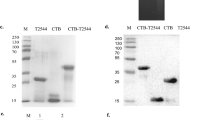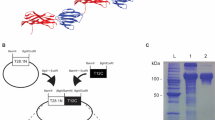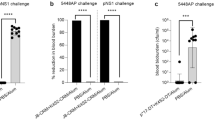Abstract
INJECTION of relatively large quantities of non-living antigens into either neonatal or adult animals often results in the establishment of immunological tolerance characterized by specific suppression of antibody formation on subsequent challenge immunization1. Immune tolerance to bacteria has been demonstrated most often in mice injected with polysaccharide antigen derived from pneumococci2,3. Somewhat similar states of immunological tolerance to antigens derived from other micro-organisms have also been investigated. For example, tolerance to Shigella paradysenteriae antigens has been observed in mice after a single administration of a relatively large concentration of soluble Shigella antigen within 12–24 h after birth4. The resulting tolerance persisted for at least 8–12 weeks, depending on the dose and route of antigen administered at birth. Tolerance to Shigella has been terminated in unresponsive mice by transfer of spleen cell suspensions from normal or Shigella immune donors5. Administration of hyperimmune anti-Shigella serum to tolerant mice, however, has not restored agglutinin forming ability6.
This is a preview of subscription content, access via your institution
Access options
Subscribe to this journal
Receive 51 print issues and online access
$199.00 per year
only $3.90 per issue
Buy this article
- Purchase on Springer Link
- Instant access to full article PDF
Prices may be subject to local taxes which are calculated during checkout
Similar content being viewed by others
References
Smith, R. T., Adv. Immunol., edit. by Taliaferro, W. H., and Humphrey, J. W., 1, 67 (1961).
Felton, L. D., and Ottinger, B., J. Bact., 43, 94 (1942).
Siskind, G. W., Paterson, P. Y., and Thomas, L., J. Immunol., 90, 929 (1963).
Friedman, H., and Gaby, W. L., J. Immunol., 85, 478 (1960).
Friedman, H., J. Immunol., 92, 201 (1964).
Friedman, H., J. Immunol. (in the press).
Mannick, J. A., Ann. Surg., 156, 356 (1962).
Cohen, E. P., and Parks, J. J., Science, 144, 1012 (1964).
Fishman, M., J. Exp. Med., 114, 837 (1961).
Vredevoe, D. L., and Nelson, E. L., Biochem. Biophys. Res. Commun., 10, 221 (1963).
Friedman, H., Science, 146, 934 (1964).
Nossal, G. J. V., Adv. Immunol., 2, 163 (1962).
Gierer, A., and Schramm, G., Nature, 177, 702 (1956).
Moloney, J. B., Acta Intern. Contre. Cancre, 19, 250 (1963).
Friedman, H., Experientia, 19, 537 (1963).
Friedman, H., Ann. N.Y. Acad. Sci., 114, 444 (1964).
Feldman, M., Globerson, A., and Nachtigal, D., in Conceptual Adv. in Immunol. and Oncology, 424 (Harper and Row, N.Y., 1963).
Author information
Authors and Affiliations
Rights and permissions
About this article
Cite this article
FRIEDMAN, H. Transfer of RNA Extracts from Immune Donor Spleen Cells to Shigella-tolerant Recipient Mice. Nature 207, 1315–1316 (1965). https://doi.org/10.1038/2071315b0
Issue Date:
DOI: https://doi.org/10.1038/2071315b0
Comments
By submitting a comment you agree to abide by our Terms and Community Guidelines. If you find something abusive or that does not comply with our terms or guidelines please flag it as inappropriate.



